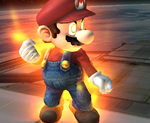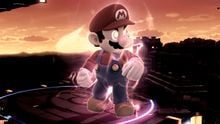Final Smash: Difference between revisions
m (Text replacement - "{{[Qq]uote2\|" to "{{quote|") |
m (DK Island Swing specified.) |
||
| Line 114: | Line 114: | ||
|[[Konga Beat]]{{anchor|Konga Beat}} | |[[Konga Beat]]{{anchor|Konga Beat}} | ||
|[[File:Ssb brawl logo.png|center|60px]][[File:Logo EN - Super Smash Bros. Wii U 3DS.png|center|60px]] | |[[File:Ssb brawl logo.png|center|60px]][[File:Logo EN - Super Smash Bros. Wii U 3DS.png|center|60px]] | ||
|Donkey Kong pulls out a pair of [[bongo]]s and | |Donkey Kong pulls out a pair of [[bongo]]s and starts playing them, with a version of [[DK Island Swing]] replacing the current background music. The music waves surrounding the bongos will damage opponents and the length of the waves increases if the player presses an attack button with proper timing to the beat. | ||
|[[File:Konga Beat SSB4 Wii U.jpg|200px]] | |[[File:Konga Beat SSB4 Wii U.jpg|200px]] | ||
|- | |- | ||
Revision as of 16:41, September 13, 2024
- This article is about a type of special move in the Super Smash Bros. series. For the mission in Mario & Luigi: Paper Jam, see Final Smash (mission).
- “The basic gist of it? I suppose you could say it’s kind of like a powerful and personalized hammer. (Or maybe not...)”
- —Masahiro Sakurai, Smash Bros. DOJO!!
The Final Smash is a special move that can be used from breaking a Smash Ball in Super Smash Bros. Brawl, Super Smash Bros. for Nintendo 3DS / Wii U, and Super Smash Bros. Ultimate. After breaking open one of these items, its power flows into the fighter, charging them up. The fighter will begin to emit a yellow aura, and their eyes will turn yellow as well. The character will activate their Final Smash the next time the player uses their standard special move. However, if the fighter does not initiate the Final Smash soon enough, they can drop the Smash Ball if they get attacked enough times. Final Smashes can be used by any fighter, including those representing the Super Mario franchise.
The games also have a function known as a Pity Final Smash[1] (called Easy Final Smash in Super Smash Bros. for Nintendo 3DS / Wii U). If a fighter is KO'd while being five points or stocks behind the leading player, the fighter respawns with an Easy Final Smash. An Easy Final Smash serves the same functions as a normal Final Smash, but it has the advantage of not having a Smash Ball form, and therefore cannot be taken away by other fighters. Easy Final Smashes also return in Super Smash Bros. for Nintendo 3DS / Wii U, but CPU players will not receive one even if the conditions are met.
The Final Smashes in Super Smash Bros. Ultimate are much quicker and require little to no control, so players can return to fighting quickly. As a result, many fighters that had controllable/transformative Final Smashes received new, instant, and non-transformative Final Smashes (e.g. Super Dragon being replaced by Stampede!, and Konga Beat being replaced by Jungle Rush), although some retain their transformation effect (e.g. Giga Bowser Punch) or can still be affected by user input (e.g. Octopus and Super Sonic can be controlled vertically); while Final Smashes such as Shadow Mario Paint and Grand Star have been made less powerful. This game also introduces the FS Meter, where players can charge up a Final Smash with a meter under the damage meter. The Final Smashes released from these are much weaker, easier to dodge, and can be shielded against. When the player activates a Final Smash, a cut-in of the summoner's face briefly appears on-screen.
History
Most Final Smashes are based on the character's individual background in their series, like Zelda and Sheik's Light Arrow. However, some have been invented specially for Super Smash Bros. Brawl, like Mario's Mario Finale. Although they were planned to be included in the original Super Smash Bros.[2] (an unused voice sample of Ness's announcing "PK Starstorm" can be found in the files), Final Smashes made their first appearance in Super Smash Bros. Brawl. Masahiro Sakurai compared the Final Smash as a more powerful, "majestic" Hammer item (found in all Super Smash Bros. games),[3] as all players rush to collect it, and the ones who didn't flee after it has been collected.
List of Final Smashes
These are Final Smashes used only by fighters representing the Super Mario franchise. A complete list can be found on this page.
| Character | Final Smash | Appears in | Brief description | Picture |
|---|---|---|---|---|
| Mario | Mario Finale | Mario fires a giant wave of fireballs that travels across the screen. Any opponents caught in it will be damaged and carried away. | 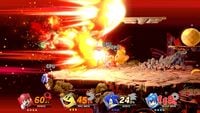
| |
| Luigi | Negative Zone | Luigi starts dancing and causes a large green circle to appear. Any opponents in the circle's radius will have a variety of things happen to them, such as tripping rapidly, falling asleep, or constantly taunting uncontrollably. | 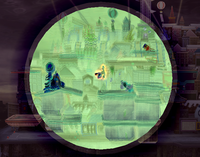
| |
| Poltergust 5000 | Luigi pulls out his ghost vacuum and begins sucking nearby opponents into it which deals repeated damage. After a short period of time, the trapped opponents will be shot out of the vacuum. In Super Smash Bros. for Nintendo 3DS / Wii U, the vacuum Luigi uses is the Poltergust 5000 from Luigi's Mansion: Dark Moon, while the vacuum in Super Smash Bros. Ultimate is the Poltergust G-00 from Luigi's Mansion 3. | 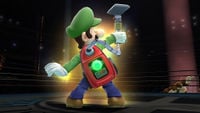
| ||
| Poltergust G-00 | 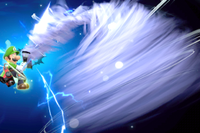
| |||
| Peach | Peach Blossom | Peach/Daisy starts dancing while giant portraits of them appear on the screen, which causes opponents to fall asleep. Peaches/Daisies will also appear on the stage, which allow them to heal any damage done to them. | 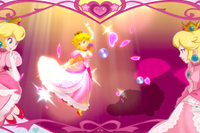
| |
| Daisy | Daisy Blossom | 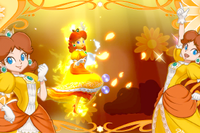
| ||
| Bowser | Giga Bowser | Bowser transforms into Giga Bowser. He can move around freely and his attacks remain the same, but they are stronger and he cannot flinch, though he will still take damage. Some of his attacks also have added effects, such as ice and darkness. Taking damage will reduce the amount of time spent in this transformation. | 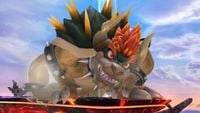
| |
| Giga Bowser Punch | Bowser transforms into a giant Giga Bowser and moves to the background. He will then proceed to aim at players and punch them for heavy damage. At high enough percentages, the opponents can be screen-KO'd. | 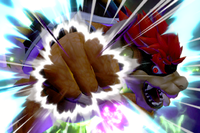
| ||
| Dr. Mario | Doctor Finale | Dr. Mario fires two giant vitamin capsules that travel across the screen, getting bigger and traveling wider as they go. Any opponents caught in it will be damaged and carried off. | 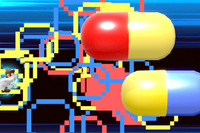
| |
| Rosalina & Luma | Power Star | Rosalina summons a Power Star (in Super Smash Bros. for Nintendo 3DS / Wii U) or a Grand Star (in Super Smash Bros. Ultimate), which shoots a plethora of smaller stars around the stage, damaging opponents. The star grows in size as it shoots the smaller stars and explodes at the end of the Final Smash. The Grand Star also pulls in opponents while active. | 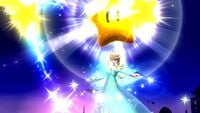
| |
| Grand Star | 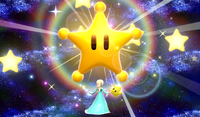
| |||
| Bowser Jr. | Shadow Mario Paint | Bowser Jr. (or a Koopaling) turns into Shadow Mario and paints a giant "X" across the screen. Any player that comes in contact with it will take damage until it explodes, which will launch opponents. | 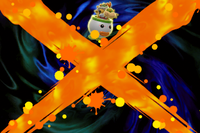
| |
| Piranha Plant | Petey Piranha | The Piranha Plant summons Petey Piranha (who wields his cages from Super Smash Bros. Brawl's Subspace Emissary mode), and he jumps around, damaging players and trapping them inside his cages. He then breathes fire on the cages and slams them down. | 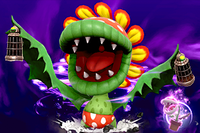
| |
| Yoshi | Super Dragon | Yoshi transforms into Winged Yoshi and is able to fly freely around the stage. In this form, Yoshi can fire large fireballs. | 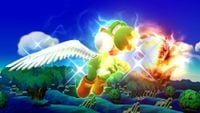
| |
| Stampede! | Yoshi sends players he catches into a rocky canyon like setting, where a bunch of multi-colored Yoshis stampede through (referencing the opening to Super Smash Bros. Melee) and run over the player(s) in the process. | 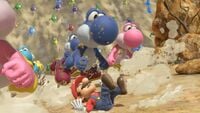
| ||
| Donkey Kong | Konga Beat | Donkey Kong pulls out a pair of bongos and starts playing them, with a version of DK Island Swing replacing the current background music. The music waves surrounding the bongos will damage opponents and the length of the waves increases if the player presses an attack button with proper timing to the beat. | 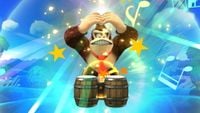
| |
| Jungle Rush | Donkey Kong will do a punch to trap players. Any opponents caught will be treated to a series of rapid punches from Donkey Kong before he finishes with an uppercut, referencing Donkey Kong Jungle Beat. | 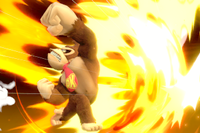
| ||
| Diddy Kong | Rocketbarrel Barrage | Diddy Kong equips his Rocketbarrel Pack and Peanut Popguns and starts flying around the stage firing explosive peanuts at opponents. The player can control Diddy Kong's flight and peanut firing. | 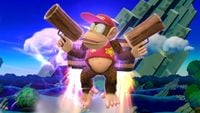
| |
| Hyper Rocketbarrel | Diddy Kong equips his Rocketbarrel Pack and zips across the screen in many different directions. At the end, he homes in on one random player and the barrels will explode on them. | 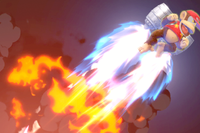
| ||
| King K. Rool | Blast-o-Matic | King K. Rool traps players on Donkey Kong Island and fires a laser from his Blast-o-Matic to blow up the whole island, damaging players, referencing Donkey Kong 64 where failure to shutdown the machine in Hideout Helm will result in the island’s destruction. | 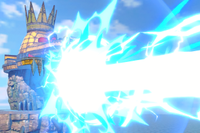
| |
| Wario | Wario-Man | Wario transforms into Wario-Man gaining invincibility and causing his normal attacks to do more damage. He moves incredibly fast in this form, and his aerial attacks even give him the ability to fly (he will rise in the air whenever he performs an aerial attack, with the exception of his down aerial attack which causes him to plummet downward). After enough time has passed, he will return to normal. | 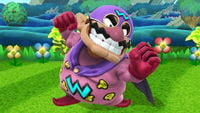
| |
| Wario dashes forwards and opponents caught are taken to a comic book like setting. There, Wario, now transformed into Wario-Man, does a bunch of attacks on the opponents in all different directions before finishing off with a waft, launching them. | 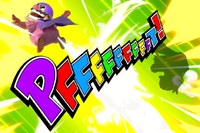
|
Names in other languages
| Language | Name | Meaning | Notes |
|---|---|---|---|
| Chinese | 最後的絕招 (Traditional) 最后的绝招 (Simplified)[?] Zuìhòu de juézhāo |
Final Trump Card | |
| Dutch | Ultieme Smash[?] | Ultimate Smash | |
| French | Smash final[?] | Final Smash | |
| German | Ultra-Smash[?] | Ultra Smash | |
| Italian | Smash finale[?] | Final Smash | |
| Portuguese | Smash Final[?] | Final Smash | |
| Russian | Финальный смеш[?] Final'nyy smesh |
Final Smash | |
| Spanish | Smash Final[?] | Final Smash |
References
- ^ December 5, 2007. The Battle for the Smash Ball. Smash Bros. DOJO!!. Retrieved November 8, 2018.
- ^ "Actually, I thought of using the Smash Ball since the very first Nintendo 64 version of the game." – Wii.com - Iwata Asks: Super Smash Bros. Brawl, Vol. 5. Masahiro Sakurai. Retrieved January 28, 2008.
- ^ "People who have played the previous Smash Bros. title need only imagine the stronger, more majestic version of the Hammer to understand what I’m talking about." – Wii.com - Iwata Asks: Super Smash Bros. Brawl, Vol. 5. Masahiro Sakurai. Retrieved January 28, 2008.
